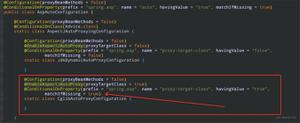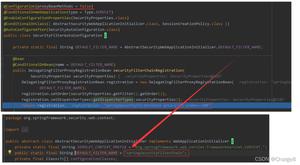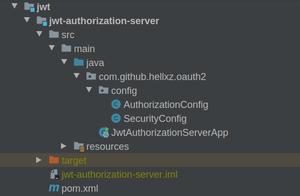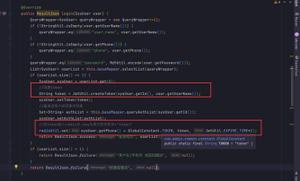Spring AOP 之二:Pointcut注解表达式
本文内容纲要:Spring AOP 之二:Pointcut注解表达式
简介
在Spring AOP概述中我们重点注意的是AOP的整体流程和Advice,简化了一些其他的东西,其中就有一些对灵活应用Spring AOP很重要的知识点,例如Pointcut表达式,下面就介绍一下Spring AOP的Pointcut表达式。
如果你对Pointcut表达式的作用还不是很了解,可以先看一下Spring AOP概述,也可以先了解一下匹配规则,后面会有一些具体的例子来帮助理解。
我们使用最多的就是execution表示了,下面就从execution表达式开始介绍吧。
注意:把designators翻译为表达式也许不太合适,所以不必纠结这个问题,只需要知道在看到Spring AOP中的designators知道对应的是个什么东西就可以了。管它是表达式还是指示器只是一个代称而已。
execution表达式
execution(modifiers-pattern? ret-type-pattern declaring-type-pattern?name-pattern(param-pattern)throws-pattern?)
上面的就是execution表达式的格式,execution匹配的就是连接点(Joinpoint,一般是方法),看上面的表达式execution是固定的,方法的修饰符是可选的,返回类型是必须的,定义的全限类型也是可选的,名称是必须的,参数是必须的,这些都可以使用通配符。
任何的public方法
execution(public * *(..))以set开始的方法
execution(* set*(..))定义在cn.freemethod.business.pack.Say接口中的方法
execution(* cn.freemethod.business.pack.Say.*(..))任何cn.freemethod.business包中的方法
execution(* cn.freemethod.business.*.*(..))任何定义在com.xyz.service包或者其子包中的方法
execution(* cn.freemethod.business..*.*(..))其他表达式
任何在com.xyz.service包中的方法
within(com.xyz.service.*)任何定义在com.xyz.service包或者其子包中的方法
within(com.xyz.service..*)任何实现了com.xyz.service.AccountService接口中的方法
this(com.xyz.service.AccountService)任何目标对象实现了com.xyz.service.AccountService的方法
target(com.xyz.service.AccountService)一般情况下代理类(Proxy)和目标类(Target)都实现了相同的接口,所以上面的2个基本是等效的。
有且只有一个Serializable参数的方法
args(java.io.Serializable)只要这个参数实现了java.io.Serializable接口就可以,不管是java.io.Serializable还是Integer,还是String都可以。
目标(target)使用了@Transactional注解的方法
@target(org.springframework.transaction.annotation.Transactional)目标类(target)如果有Transactional注解中的所有方法
@within(org.springframework.transaction.annotation.Transactional)任何方法有Transactional注解的方法
@annotation(org.springframework.transaction.annotation.Transactional)有且仅有一个参数并且参数上类型上有Transactional注解
@args(org.springframework.transaction.annotation.Transactional)注意是参数类型上有Transactional注解,而不是方法的参数上有注解。
-- bean的名字为tradeService中的方法
bean(simpleSay) bean名字为simpleSay中的所有方法。
-- bean名字能匹配
bean(*Impl)bean名字匹配*Impl的bean中的所有方法。
实例
这个实例是对Spring AOP概述中介绍的实例进行了扩展。当然下面给的实例也可以独立测试,最好是一个一个测试观察输出了验证,多个输出结果不够直观。
下面的图片是项目工程目录结构:
下面的代码列表因为比较多,只能展示部分代码。
--OtherPointcutAspect:
import org.aspectj.lang.annotation.After;
import org.aspectj.lang.annotation.Aspect;
import org.springframework.stereotype.Component;
@Component
@Aspect
public class OtherPointcutAspect {
// @After("cn.freemethod.pointcut.OtherPointcut.argsSerializable()")
public void argsSerialize(){
System.out.println("OtherPointcutAspect argsSerialize after...");
}
// @After("cn.freemethod.pointcut.OtherPointcut.inBusinessPackage()")
public void inBusinessPackage(){
System.out.println("OtherPointcutAspect inBusinessPackage after...");
}
// @After("cn.freemethod.pointcut.OtherPointcut.inBusinessOrSubPackage()")
public void inBusinessOrSubPackage(){
System.out.println("OtherPointcutAspect inBusinessOrSubPackage after...");
}
// @After("cn.freemethod.pointcut.OtherPointcut.proxyImplementHaveResultBusinessInteferce()")
public void proxyImplementHaveResultBusinessInteferce(){
System.out.println("OtherPointcutAspect proxyImplementHaveResultBusinessInteferce after...");
}
// @After("cn.freemethod.pointcut.OtherPointcut.targetImplementBusinessInteferce()")
public void targetImplementBusinessInteferce(){
System.out.println("OtherPointcutAspect targetImplementBusinessInteferce after...");
}
// @After("cn.freemethod.pointcut.OtherPointcut.targetHaveTransactional()")
public void targetHaveTransactional(){
System.out.println("OtherPointcutAspect targetHaveTransactional after...");
}
// @After("cn.freemethod.pointcut.OtherPointcut.targetDeclareHaveTransactional()")
public void targetDeclareHaveTransactional(){
System.out.println("OtherPointcutAspect targetDeclareHaveTransactional after...");
}
// @After("cn.freemethod.pointcut.OtherPointcut.methodHaveTransactional()")
public void methodHaveTransactional(){
System.out.println("OtherPointcutAspect methodHaveTransactional after...");
}
@After("cn.freemethod.pointcut.OtherPointcut.argsHaveValueAnnotation()")public void argsHaveTransactional(){
System.out.println("OtherPointcutAspect argsHaveValueAnnotation after...");
}
// @After("cn.freemethod.pointcut.OtherPointcut.beanName()")
public void beanName(){
System.out.println("OtherPointcutAspect beanName after...");
}
// @After("cn.freemethod.pointcut.OtherPointcut.matchBeanName()")
public void matchBeanName(){
System.out.println("OtherPointcutAspect matchBeanName after...");
}
}
上面是一个测试Pointcut表达式的切面,很多Advice都注释了,请为了从输出中直观的了解Pointcut表达式匹配到了什么方法(Joinpoint),请根据自己的需要测试的Pointcut表达式取消添加注释。
--ExecutionPointcutAspect:
import org.aspectj.lang.annotation.After;
import org.aspectj.lang.annotation.AfterReturning;
import org.aspectj.lang.annotation.Aspect;
import org.aspectj.lang.annotation.Before;
import org.springframework.stereotype.Component;
@Component
@Aspect
public class ExecutionPointcutAspect {
@Before("cn.freemethod.pointcut.ExecutionPointcut.allPublicMethod()")public void allPublicBefore(){
System.out.println("PointcutExpressionAspect allPublicBefore...");
}
@After("cn.freemethod.pointcut.ExecutionPointcut.allStartSayMethod()")
public void sayAfter(){
System.out.println("PointcutExpressionAspect sayAfter...");
}
@AfterReturning("cn.freemethod.pointcut.ExecutionPointcut.allInSayInterfaceMethod()")
public void allInSayInterfaceMethod(){
System.out.println("PointcutExpressionAspect allInSayInterfaceMethod...");
}
@Before("cn.freemethod.pointcut.ExecutionPointcut.allInBusinessPackage()")
public void allInBusinessPackageBefore(){
System.out.println("PointcutExpressionAspect all business before...");
}
@After("cn.freemethod.pointcut.ExecutionPointcut.allInBusinessOrSubPackage()")
public void allallInBusinessOrSubPackageAfter(){
System.out.println("PointcutExpressionAspect allallInBusinessOrSubPackageAfter...");
}
}
---ParamBean:
import org.springframework.transaction.annotation.Transactional;
@Transactional
public class ParamBean {
}
--HaveResultBusinessImpl:
import org.springframework.stereotype.Service;
import cn.freemethod.business.HaveResultBusiness;
@Service
public class HaveResultBusinessImpl implements HaveResultBusiness {
@Overridepublic Integer getResult(Integer div) {
System.out.println("HaveResultBusinessImpl getResult");
Integer result = 100 / div;
return result;
}
}
--IOtherPointcutImpl:
import org.springframework.stereotype.Service;
import org.springframework.transaction.annotation.Transactional;
import cn.freemethod.bean.ParamBean;
import cn.freemethod.business.pack.IOtherPointcut;
@Transactional
@Service
public class IOtherPointcutImpl implements IOtherPointcut {
@Overridepublic Integer printInteger(Integer arg) {
System.out.println("IOtherPointcutImpl printInteger");
return arg;
}
@Override
public void withAnotationParam(ParamBean arg) {
System.out.println("IOtherPointcutImpl withAnotationParam");
}
}
--SimpleSay:
import org.springframework.stereotype.Service;
import org.springframework.transaction.annotation.Transactional;
import cn.freemethod.business.pack.Say;
@Transactional
@Service
public class SimpleSay implements Say {
@Overridepublic String sayChiness(String name) {
String result = "你好:" + name;
System.out.println(result);
return result;
}
@Override
public String sayEnglish(String name) {
String result = "Hello " + name;
System.out.println(result);
return result;
}
@Transactional
@Override
public String whatSay() {
System.out.println("what say");
return "what say";
}
}
--IOtherPointcut:
import cn.freemethod.bean.ParamBean;
public interface IOtherPointcut {
Integer printInteger(Integer arg);void withAnotationParam(ParamBean arg);
}
--Say:
public interface Say {
String sayChiness(String name);String sayEnglish(String name);
String whatSay();
}
--HaveResultBusiness:
public interface HaveResultBusiness {
Integer getResult(Integer div);}
--AspectConfig:
import org.springframework.context.annotation.ComponentScan;
import org.springframework.context.annotation.Configuration;
import org.springframework.context.annotation.EnableAspectJAutoProxy;
@Configuration
@EnableAspectJAutoProxy
@ComponentScan(basePackages = {"cn.freemethod"})
public class AspectConfig {
}
--ExecutionPointcut:
import org.aspectj.lang.annotation.Aspect;
import org.aspectj.lang.annotation.Pointcut;
@Aspect
public class ExecutionPointcut {
@Pointcut("execution(public * *(..))")public void allPublicMethod(){}
@Pointcut("execution(* say*(..))")
public void allStartSayMethod(){}
@Pointcut("execution(* cn.freemethod.business.pack.Say.*(..))")
public void allInSayInterfaceMethod(){}
@Pointcut("execution(* cn.freemethod.business.*.*(..))")
public void allInBusinessPackage(){}
@Pointcut("execution(* cn.freemethod.business..*.*(..))")
public void allInBusinessOrSubPackage(){}
}
--OtherPointcut :
import org.aspectj.lang.annotation.Aspect;
import org.aspectj.lang.annotation.Pointcut;
@Aspect
public class OtherPointcut {
@Pointcut("within(cn.freemethod.business.impl.*)")public void inBusinessPackage(){}
@Pointcut("within(cn.freemethod.business..*)")
public void inBusinessOrSubPackage(){}
@Pointcut("this(cn.freemethod.business.HaveResultBusiness)")
public void proxyImplementHaveResultBusinessInteferce(){}
@Pointcut("target(cn.freemethod.business.HaveResultBusiness)")
public void targetImplementBusinessInteferce(){}
@Pointcut("args(java.io.Serializable)")
// @Pointcut("args(java.lang.Integer)")
public void argsSerializable(){}
@Pointcut("@target(org.springframework.transaction.annotation.Transactional)")public void targetHaveTransactional(){}
@Pointcut("@within(org.springframework.transaction.annotation.Transactional)")
public void targetDeclareHaveTransactional(){}
@Pointcut("@annotation(org.springframework.transaction.annotation.Transactional)")
public void methodHaveTransactional(){}
@Pointcut("@args(org.springframework.transaction.annotation.Transactional)")
public void argsHaveValueAnnotation(){}
@Pointcut("bean(simpleSay)")
public void beanName(){}
@Pointcut("bean(*Impl)")
public void matchBeanName(){}
}
--AnnotationConfigStart:
import org.springframework.context.annotation.AnnotationConfigApplicationContext;
import org.springframework.context.support.AbstractApplicationContext;
import cn.freemethod.business.HaveResultBusiness;
import cn.freemethod.business.pack.Say;
import cn.freemethod.config.AspectConfig;
public class AnnotationConfigStart {
public static void main(String[] args) { AbstractApplicationContext context = new AnnotationConfigApplicationContext(AspectConfig.class);
HaveResultBusiness haveResultBusiness = context.getBean(HaveResultBusiness.class);
haveResultBusiness.getResult(100);
Say say = context.getBean(Say.class);
say.sayChiness("tim");
say.sayEnglish("tim");
say.whatSay();
context.close();
}
}
--PointcutExpressionStart:
import org.springframework.context.annotation.AnnotationConfigApplicationContext;
import org.springframework.context.support.AbstractApplicationContext;
import cn.freemethod.bean.ParamBean;
import cn.freemethod.business.HaveResultBusiness;
import cn.freemethod.business.pack.IOtherPointcut;
import cn.freemethod.business.pack.Say;
import cn.freemethod.config.AspectConfig;
public class PointcutExpressionStart {
public static void main(String[] args) { AbstractApplicationContext context = new AnnotationConfigApplicationContext(AspectConfig.class);
IOtherPointcut iOtherPointcut = context.getBean(IOtherPointcut.class);
iOtherPointcut.printInteger(new Integer(10));
iOtherPointcut.withAnotationParam(new ParamBean());
HaveResultBusiness haveResultBusiness = context.getBean(HaveResultBusiness.class);
haveResultBusiness.getResult(100);
Say say = context.getBean(Say.class);
say.sayChiness("tim");
say.sayEnglish("tim");
say.whatSay();
context.close();
}
}
本文内容总结:Spring AOP 之二:Pointcut注解表达式
原文链接:https://www.cnblogs.com/miniSimple/p/12375962.html
以上是 Spring AOP 之二:Pointcut注解表达式 的全部内容, 来源链接: utcz.com/z/362856.html








